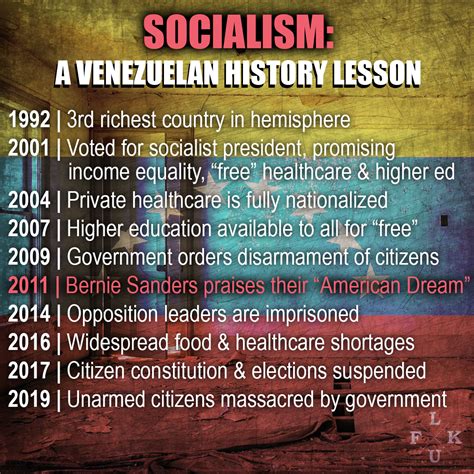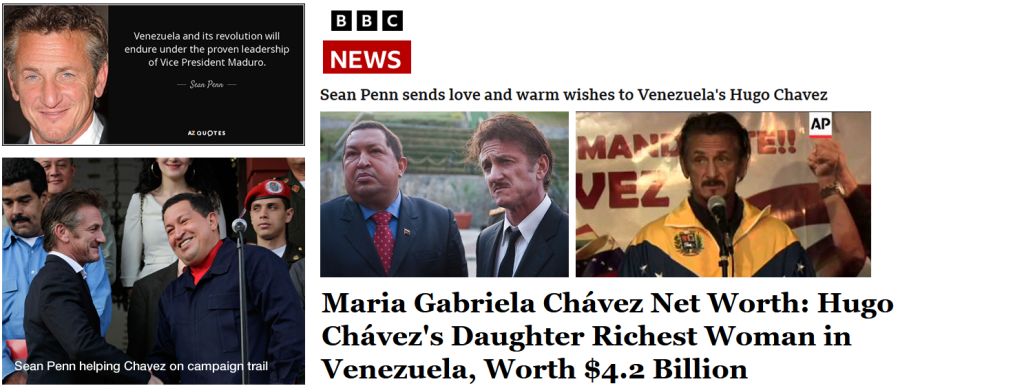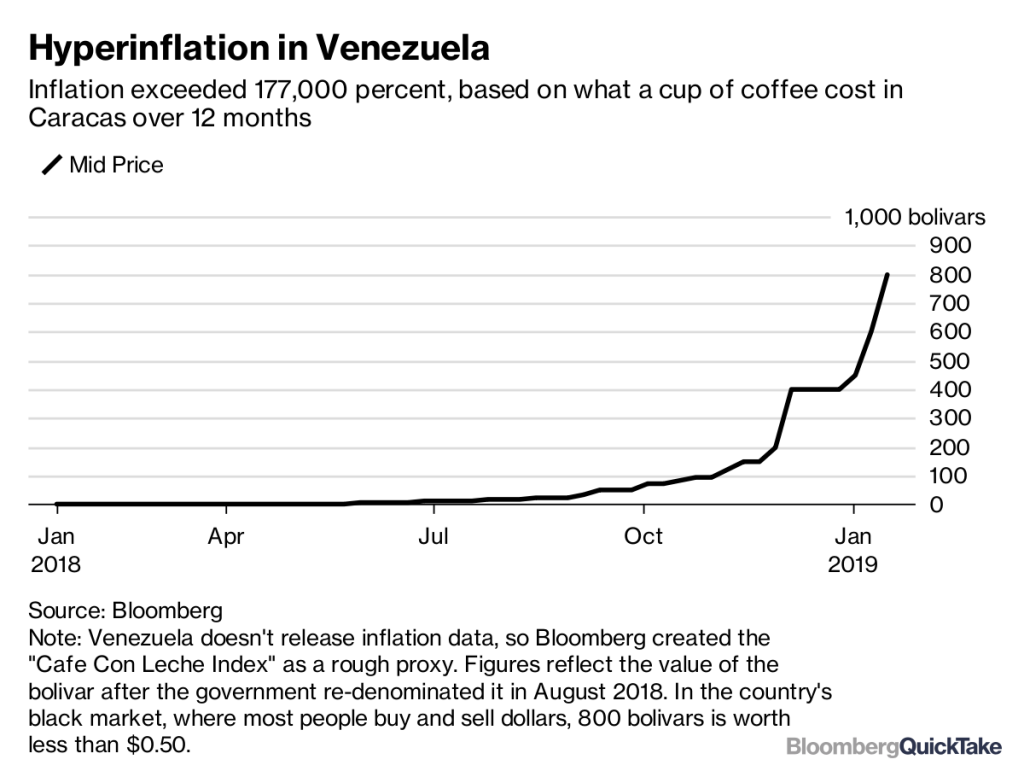Here is the timeline on how the third richest country in the hemisphere went from thriving to total economic chaos and killing their own citizens.

Hollywood simple idiots like Sean Penn, Oliver Stone, Michael Moore, Naomi Campbell praised these tyrants socialist movement and their total destruction of a thriving country. Of course as in all socialist countries the only ones that benefit are the tyrants. Chavez was a poor farmer when he took over and by 2015 his daughter was the richest person in the entire country with a net worth of over $4,200,000,000.



February 22, 2019 by Rahima Nasa at PBS.org
The humanitarian crisis in Venezuela may reach a flash point this weekend as political tensions over humanitarian aid escalate.
Venezuelans have faced severe food and medicine shortages due to an economy rocked by hyperinflation. Over 3 million Venezuelans have fled the country, most since 2015, according to the United Nations. It’s estimated that another 2 million people will leave in 2019. According to the United Nations Human Rights Office, at least 40 people have been killed since protests began in January. Another 696 people were arrested, the highest recorded detentions in Venezuela in 20 years.
But as resources grow increasingly scant, the country’s embattled president, Nicolás Maduro, has instructed the military to block aid deliveries from the U.S. and others. Unable to reach Venezuela, supplies sent by the U.S. have been stored in a closely guarded warehouse in Colombia, and Maduro ordered all crossings along the Brazil border closed. Maduro defended his decision to prevent aid from entering the country by proclaiming that Venezuelans are not “beggars.”
But in bold defiance of Maduro, opposition leader Juan Guaidó vowed to forcibly transport and distribute the aid by Saturday, a move that experts fear could lead to violent clashes between the Venezuelan military — which is still loyal to Maduro — and opposition forces.
The situation in Venezuela hasn’t always been so dire. Venezuela’s oil reserves once made it one of the richest Latin American countries — fortune that has since turned to hardship. To understand how Venezuela has reached its current state of crisis, it’s necessary to look back at the country’s socialist political tumult over the past six years.
2013
On March 5, Hugo Chávez, the country’s longtime president, died of cancer at 58. Maduro, who Chávez groomed to replace him, was elected into office less than a month later, gaining 50.6 percent of the vote.
Chávez was a charismatic and admired leader in Venezuela, largely thanks to his social welfare programs. After he assumed the presidency in 1999, he continued nationalizing the oil industry and used the profit to fund food subsidies, education and health care programs. Under his administration, unemployment and poverty halved, and income per capita more than doubled.
“Between 2001 and 2013 Venezuela receives the equivalent of three Marshall Plans in inflation adjusted dollars — that’s for one country of thirty million people,” said Harold Trinkunas, deputy director for the Center for International Security and Cooperation at Stanford University. “That stopped after 2013, with the decline of the price of oil.”
That largely unrestrained spending, which Maduro continued after he took office, created a huge deficit that sent the country into an economic spiral.
2014
On January 23, in the midst of high levels of violence, food shortages and a scarcity of basic goods, opposition leaders Leopoldo López and María Corina Machado began a campaign to remove Maduro from office. That February, thousands of Venezuelans took to the streets in protest. Over a three-month period of violent demonstrations, 43 people were killed.
Venezuela’s Central Bank confirmed on December 30 that the country had entered a recession due to plummeting oil prices. The inflation rate that year surpassed 63 percent, the highest in the Americas. The government was forced to make cuts in public spending, making it difficult for poor Venezuelans to access food and medicine.
2015
In the legislative elections held December 6, the opposition party gained a two-thirds supermajority in the National Assembly. Maduro, fearing for the security of his position, stacked the Supreme Court with justices loyal to him.
On December 30, the Supreme Court blocked four newly elected lawmakers from joining the assembly just days before they were due to be sworn in, which Maduro’s critics saw as an attempt to chip away at opposition’s majority.
Reports would later show that food shortages were so severe that Venezuelans lost an average of 19 pounds between 2015 and 2016.
2017
The Supreme Court banned an opposition leader from participating in the April 7 elections. The next day, Venezuelans responded with mass demonstrations all over the country. The protests lasted for months, resulting in violent clashes with riot police that left 66 dead.
On July 30, in an election considered by critics to have been a sham, voters elected the members of the Constituent Assembly, which was created with the intent to change the constitution — a parallel to the National Assembly. Neighboring countries in Latin America, as well as the U.S., Canada and Spain, said they would not recognize the authority of the new branch. The Constituent Assembly was officially sworn in on August 4.
2018
Presidential elections were held on May 20, and Maduro was reelected despite claims of fraud from the opposition coalition. The U.S. decried the election as unfair and anti-democratic before any voting had even taken place.
On November 8, the United Nations Refugee Agency announced that over 3 million people had fled Venezuela due to massive shortages of food and medicine.
“It’s going to be incredibly destabilizing to the region because even just a million people migrating would be an enormous burden and is straining local capacity in terms of fiscal costs,” Tufro said.
2019
Not long after Maduro’s inauguration on January 10, Venezuelans took to the streets calling for him to step down. Guaidó, leading the opposition, claimed the presidency, citing emergency powers granted from the constitution.
The U.S. quickly showed support for Guaidó. On January 23, Maduro responded by severing diplomatic ties with the U.S., ordering all American diplomats out of the country within 72 hours. U.S. Secretary of State Mike Pompeo said that they would instead abide by Guaidó’s directive to maintain diplomatic relations with Venezuela.
Humanitarian aid from the U.S. arrived to Venezuela at its border with Colombia on February 8, which Maduro blocked.
On February 21, Maduro closed the border Venezuela shares with Brazil in an effort to block aid from coming into the country. A day later, at least two civilians were killed and dozens were injured when Venezuelan security forces fired on protesters near the Brazilian border.
Meanwhile, Venezuela’s former intelligence chief Hugo Carvajal publicly rejected Maduro and called out his inner circle for rampant corruption, urging the military to turn against him. This followed President Donald Trump’s ultimatum to the Venezuelan military on February 26: side with the opposition collation or face consequences.
“If you choose this path, you will find no safe harbor, no easy exit, and no way out,” Trump said in a speech. “You will lose everything.”
Experts, however, are not optimistic that the military will turn on Maduro and allow aid to enter the country.
“The Venezuelan military especially at the most senior levels is heavily complicit in many of the crimes going on inside Venezuela related to human rights abuses and drug trafficking. So they really can’t afford to have a transition to democracy because of the fear of being held accountable,” said Trinkunas.





Recent Comments